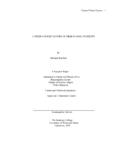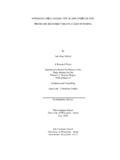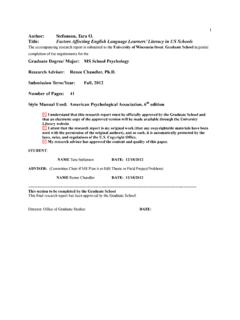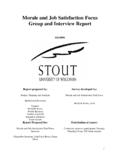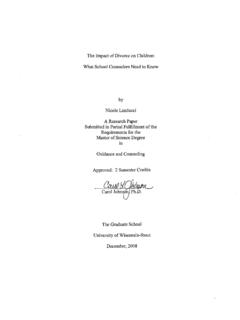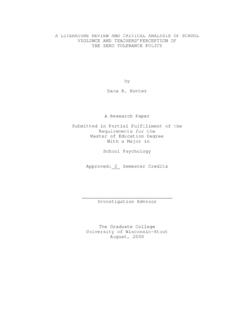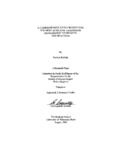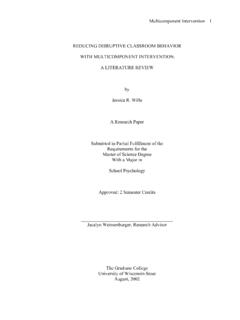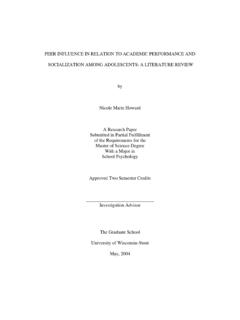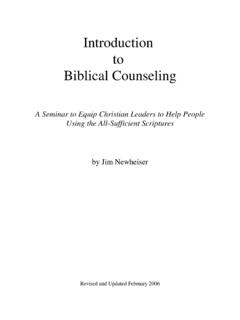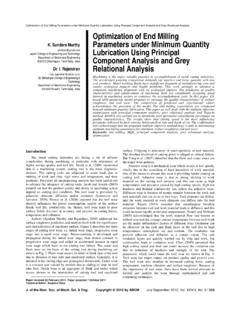Transcription of Discipline and Intergenerational Transmission
1 Discipline 1 Discipline and Intergenerational Transmission Aria Snyder and Samantha Bub Undergraduate Students: Human Development and Family Studies Key Words: Discipline practices, Intergenerational Transmission , corporal punishment Abstract The disciplinary practices that parents use on their own children affect the child throughout his or her life and influence the Discipline that they plan to use with their children. This study investigated attitudes about Intergenerational Transmission of corporal punishment and nonphysical means of Discipline by surveying 100 male and female college students ages 18-26 years of age at a Midwestern college. It was hypothesized that college students would plan to Discipline their own children the same way they were disciplined as children based on the Social Learning Theory.
2 Survey data was analyzed using frequencies, cross-tabulations, and a reliability analysis. Results indicated the majority of participants will use similar Discipline practices as their parents. These results confirmed the hypothesis and were supported by the literature. Implications for practitioners include there needs to be parenting classes that address effective Discipline practices. Suggestions for replication and future research are discussed. The way a child is disciplined has many effects on the child s physical, behavioral, and mental well-being (Bates, Deater-Deckard, Dodge, & Pettit, 2003). There is much research-based evidence of the Intergenerational Transmission of punishment when used as a Discipline practice.
3 Children of parents who used corporal punishment as a Discipline technique tend to use corporal punishment as a Discipline technique with their own children (2003). There are negative and positive perspectives on the different Discipline practices from professionals and from the children receiving the Discipline . For the purpose of this study, Discipline is defined by Evans, Savage, and Socolar as creating an environment based on parent-child relationships that encourages positive outcomes while decreasing negative behaviors (2007). The authors reviewed the literature on different Discipline practices that addressed the reasons parents use certain Discipline practices and the effects of those practices on children.
4 The authors then surveyed the perspectives of college students regarding this issue. While gathering information for the research question- What is the relationship between the ways college students were disciplined and how it affects the way they are planning on disciplining their own children - the authors found it important to understand what other studies have found regarding Discipline . The authors found many articles on gender-related parenting differences, however there were few on Intergenerational Discipline patterns. In much of the literature about Discipline , there was information about corporal punishment and the effects it has on children and their development. The literature discusses how children feel about Discipline practices and how harsh the punishments are that they receive.
5 The literature in this article discusses the different types of Discipline and how frequently the different types were used. Most of the surveys, Discipline 2statistics, and information in this literature review helped the authors in determining variables and survey questions to ask the research sample, and the research also relates to the question about what parents or future parents determine to be effective parenting. (Coffelt, et al. 2007; Evans, Savage, & Socolar, 2007; Bates, Deater-Deckard, Dodge, Lansford, & Pettit, 2003; Desbois & Konstanstareas, 2001) Coffelt et al.(2007) talks about harsh verbal and physical Discipline and the children s behaviors. This article helped with our study because it looks to see if harsh verbal and physical Discipline is associated with child internal and external problems.
6 The study found harsh Discipline of each parent is significant in the context of the other parent s harsh Discipline . Also that positive parenting buffers a child from the results of harsh Discipline by the same or the other parent. Evans, Savage, and Socolar (2007) discuss a study of different types of Discipline with young children ages 1-3 and the changes in punishment methods that occurs between those ages. The different kinds of Discipline used included, monitoring, verbal communication, modeling, ignoring, and corporal punishment, and the modes of administration included positive demeanor, negative demeanor, consistency, and follow-through. This article relates to our research question in taking a look at how Discipline practices change and what Discipline techniques parents use and how often.
7 Bates, Deater-Deckard, Dodge, Lansford, and Pettit (2003) studied adolescents attitudes about physical punishment and found that overall adolescents view physical means of punishment as negative. In families where the parents were spanked heightened the likelihood they will use spanking as a method of Discipline . The article also found that children from families that use corporal punishment as means of Discipline were more likely to use and endorse physical punishment. Desbois and Konstanstareas (2001) studied about how younger children view their behavior and the harshness of the punishments they receive. The study found that children as young as four years old could make rather reliable judgments of parental disciplinary techniques.
8 After reviewing the literature, researchers have found many ways that parents Discipline their children and that each method has different effect. What the authors did not find, however, was research that investigates whether Intergenerational parenting is a reason parents Discipline the way they do. Further research is needed in this area. The gap that the authors hope to fill is whether or not the method by which one was disciplined as a child will influence how one decides to Discipline one s own children. The theory the authors are using is Bandura s Social Learning Theory (Muuss, 1996). This theory states that individuals learn, develop, and behave because of parent to child modeling, imitation, observational learning, media, and peers.
9 An individual s behavior or temperament is the direct outcome of the parent s modeling and social and cultural influences on the individual. As applied to this study, this theory would predict Intergenerational Transmission of punishment methods that college students will Discipline their children in the same way they were disciplined by their parent or guardian. The purpose of this study was to examine the views of college students on their parents disciplining practices and what effects these practices may have on the participants own disciplining or future disciplining practices. The sample was comprised of college students from a small, Midwestern university. It is the authors hope that the Discipline 3results from this study will be used by parents, future parents, family therapists, family educators, day care providers, medical personnel, or any other profession working with parents and families to encourage healthy Discipline practices.
10 The central research question in this study is What is the relationship between the ways college students were disciplined as children and how it may affect the way they are planning on disciplining their own children? Based on the Social Learning Theory, that authors predict that parents or future parents will Discipline similarly to the ways they were disciplined when they were younger. Again, this is based on the idea that individuals mimic behavior that was modeled to them when they were younger including Discipline practices. Method Participants The site of this study was at a Midwestern university. The participants included 52 female participants and 48 male participants (N=100). Six female participants were between the ages of 18-20, 33 were between ages 21-23, and eight were between the ages of 24-26.
